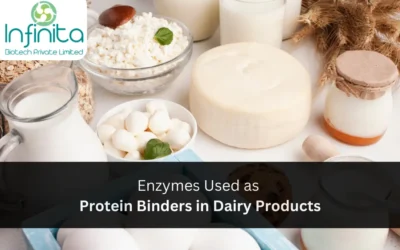Dairy enzymes are making a significant impact on the food industry, transforming the way we produce and consume dairy products. These powerful enzymes play a crucial role in various stages of food manufacturing, from enhancing food quality and shelf life to reducing food waste and improving energy efficiency. In this article, we will explore five key ways in which dairy enzymes are revolutionizing the food industry.
Understanding Dairy Enzymes
What are Dairy Enzymes?
Before delving into the transformative effects of dairy enzymes, it is essential to understand what they are. Dairy enzymes are biocatalysts that facilitate chemical reactions in dairy products. They are naturally occurring proteins found in living organisms, such as plants, animals, and microorganisms.
These enzymes play a crucial role in the production and processing of dairy products. For example, lactase is an enzyme that breaks down lactose, the sugar found in milk, into glucose and galactose. This process is essential for individuals who are lactose intolerant, as it enables them to digest dairy products without experiencing discomfort.
The Science Behind Dairy Enzymes
The science behind dairy enzymes is fascinating. Enzymes work by accelerating chemical reactions without being consumed in the process. They achieve this by lowering the energy required for a reaction to occur, allowing it to happen more rapidly. In the case of dairy enzymes, their role is to break down complex molecules into simpler forms, facilitating the production and transformation of dairy products.
One of the most well-known dairy enzymes is rennet, which is used in the production of cheese. Rennet helps coagulate milk proteins, separating them into curds and whey. This process is essential for cheese-making, as it gives cheese its characteristic texture and flavor. Without rennet, the milk would remain in a liquid state and would not solidify into cheese.
The Role of Dairy Enzymes in the Food Industry
Dairy enzymes are a crucial component in various aspects of the food industry, playing a significant role in enhancing the production of dairy products. One such area where dairy enzymes have made a remarkable impact is in cheese production. Enzymes such as rennet are utilized to coagulate milk, leading to the separation of curds and whey. This fundamental process is essential for the creation of different types of cheese, each with its unique flavor profile and texture. Moreover, dairy enzymes continue to be instrumental in the ripening of cheese, contributing to the complex development of flavors and textures that cheese enthusiasts appreciate.
Furthermore, the influence of dairy enzymes extends to the realm of yogurt manufacturing, where their presence has revolutionized production processes. Enzymes like lactase are incorporated into milk to facilitate the breakdown of lactose, making yogurt more easily digestible for individuals with lactose intolerance. Additionally, these enzymes play a crucial role in the fermentation and thickening processes that are vital for the consistency and quality of yogurt. The use of dairy enzymes in yogurt production not only improves the product’s nutritional value but also enhances its taste and texture, making it a popular choice among consumers seeking a healthy and delicious snack option.
Dairy Enzymes in Cheese Production
Cheese production is one area of the food industry where dairy enzymes have had a remarkable impact. Enzymes such as rennet are used to coagulate milk, separating it into curds and whey. This process is essential for the formation of cheese. Dairy enzymes also play a role in ripening cheese, contributing to the development of flavors and textures.
Dairy Enzymes in Yogurt Manufacturing
Yogurt manufacturing is another sector benefitting from the use of dairy enzymes. Enzymes like lactase are added to milk to break down lactose, making it more easily digestible for those with lactose intolerance. Additionally, enzymes help with the fermentation and thickening processes necessary for yogurt production.
The Benefits of Using Dairy Enzymes
Enhancing Food Quality and Shelf Life
Dairy enzymes play a crucial role in enhancing the quality and extending the shelf life of dairy products. For example, enzymes like lipases contribute to the development of desirable flavors in cheeses, while proteases help break down proteins, creating smoother textures. The use of enzymes in processing and preservation also allows dairy products to stay fresh for longer periods, reducing food waste.
Moreover, dairy enzymes aid in the prevention of spoilage by inhibiting the growth of harmful bacteria. This not only ensures the safety of the dairy products but also maintains their freshness and taste over an extended period. The controlled enzymatic reactions help in preserving the integrity of the dairy items, making them more appealing to consumers.
Improving Nutritional Value
Dairy enzymes offer the potential to improve the nutritional value of dairy products. Enzymes like phytases, for instance, enhance the bioavailability of important minerals, such as phosphorus, which can be challenging for the body to absorb. By increasing nutrient availability, dairy enzymes contribute to the overall nutritional efficacy of these products.
Furthermore, the use of dairy enzymes in processing can help in reducing lactose content in dairy products, making them more digestible for individuals with lactose intolerance. This enzymatic breakdown of lactose into simpler sugars not only improves the digestibility of dairy but also enhances its taste and texture, catering to a wider consumer base.
The Impact of Dairy Enzymes on Sustainability
Reducing Food Waste with Dairy Enzymes
Dairy enzymes are instrumental in reducing food waste in the food industry. Through the controlled breakdown of milk components, enzymes aid in transforming raw materials into valuable products, minimizing the amount of waste generated during production. This reduction in waste is not only economically beneficial but also contributes to the sustainability of the entire food supply chain.
Moreover, the use of dairy enzymes in food production can also extend the shelf life of dairy products. By breaking down proteins and fats, enzymes help inhibit the growth of spoilage microorganisms, thus reducing the likelihood of food spoilage and ultimately decreasing the amount of dairy products wasted due to expiration.
Dairy Enzymes and Energy Efficiency
Energy efficiency is another area where dairy enzymes are making a significant impact. By reducing processing times and optimizing resource utilization, enzymes help lower energy consumption in manufacturing processes. This reduction in energy requirements not only benefits the environment but also leads to cost savings for food producers.
Furthermore, the use of dairy enzymes can also improve the overall quality of dairy products, leading to increased consumer satisfaction and potentially higher demand. Enzymes play a crucial role in enhancing the texture, flavor, and nutritional value of dairy products, making them more appealing to consumers and reducing the likelihood of products being discarded due to quality issues.
The Future of Dairy Enzymes in the Food Industry
Innovations in Dairy Enzyme Technology
The future of dairy enzymes holds exciting possibilities. Ongoing research and development efforts are aiming to unlock new enzyme functionalities and applications. Innovations in dairy enzyme technology have the potential to revolutionize the food industry even further, enabling the production of healthier, more sustainable, and more delicious dairy products.
Challenges and Opportunities Ahead
While the potential of dairy enzymes in the food industry is vast, there are challenges that need to be addressed. The stability and compatibility of enzymes with different processing conditions, the cost-effectiveness of large-scale enzyme production, and regulatory considerations are among the critical areas that require further exploration. Overcoming these challenges will open up new opportunities for the integration of dairy enzymes into food manufacturing processes.
In addition to the challenges, there are also exciting opportunities on the horizon. One area of exploration is the use of dairy enzymes in the development of plant-based dairy alternatives. By harnessing the power of enzymes, scientists are working towards creating plant-based products that closely mimic the taste and texture of traditional dairy. This not only caters to the growing demand for plant-based options but also offers a more sustainable alternative to conventional dairy production.
Furthermore, the potential of dairy enzymes extends beyond the realm of dairy products. Researchers are investigating the application of these enzymes in the production of functional foods, such as fortified yogurts and probiotic beverages. By incorporating specific enzymes into these products, manufacturers can enhance their nutritional profiles and provide consumers with added health benefits.
In conclusion, dairy enzymes are transforming the food industry in remarkable ways. From their role in cheese and yogurt production to their impact on food quality, shelf life, and sustainability, these powerful biocatalysts are shaping the future of dairy products. As research and development efforts progress, the potential for further innovation and improvement in dairy enzyme technology is vast. The revolutionizing impact of dairy enzymes in the food industry is undeniable, paving the way for a more sustainable, nutritious, and delicious future.




